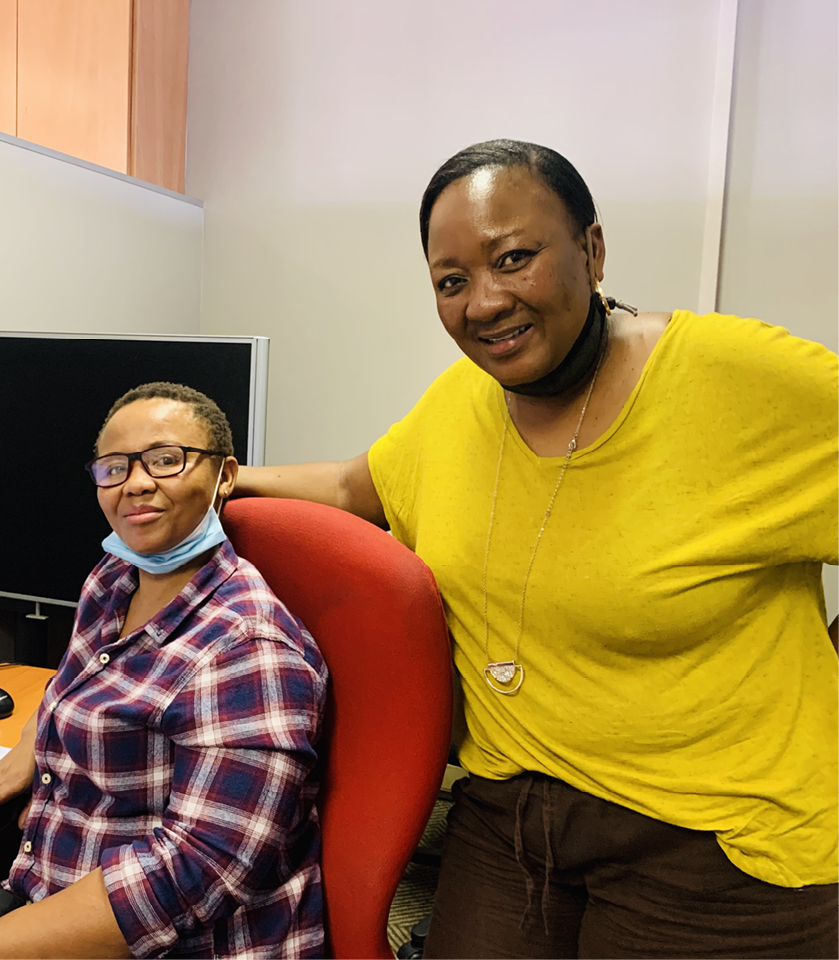Helping GBV victims who have a hearing disability
Helping GBV victims who have a hearing disability UrsulaThe inclusion and representation of people who live with disabilities is important when rendering government services because all citizens must be treated fairly and with the respect they deserve. 
This is why the Gender-Based Violence Command Centre (GBVCC) has an SMS line and Helpme GBV contact facility on Skype to provide information and psychosocial support to victims of GBV who are hard of hearing and those who are deaf.
The GBVCC is a 24-hour call centre dedicated to providing support and counselling to people affected by GBV.
Sindiswa Jojozi (45) is a social auxiliary worker at the GBVCC. As a deaf person herself, Jojozi’s job entails giving useful information to clients who are deaf or hard of hearing through SMS and Skype.
She says the centre does not only get calls from GBV victims but also from their family members and friends, who phone on their behalf.
“If the victim needs to be referred to a social worker, I am responsible for facilitating the process for them,” she says.
She is also responsible for summarising the deaf victims’ cases and writing reports.
Qualified social worker Barata Molopyane (42) is the only colleague Jojozi has who is able to communicate in South African Sign Language.
As a social auxiliary worker, it is Jojozi’s job to support Molopyane’s work, which is providing counselling and psychosocial support to victims and survivors. The pair started working together at the centre in 2016.
How does Helpme GBV work?
Explaining how the Skype service (Helpme GBV) works, Molopyane says a client contacts the centre and Jojozi accepts the request so that they can start communicating.
“A client has an option to either use a video or text to communicate. As soon as we have captured the client’s information, we open a ticket, which is basically a file that stores the client’s information and has a unique reference number,” she says.
The social worker further links the victim with the nearest police station. However, Molopyane says most victims who are deaf experience language barriers.
“From the police station to the court, sometimes the information that can help the victim is there but it becomes difficult for officials to communicate it clearly because of the language barrier. This often leads to the victim feeling failed. In order to deal with that, social workers who have the skill to use sign language end up having to revisit the case with the law enforcement officers so that the victim can be helped,” she says.
Molopyane says this is because getting a sign language interpreter is a process and they are not always available, so a lot of cases remain pending.
For this reason, Molopyane was amongst those who signed a petition for South African Sign Language to be considered as the 12th official language.
Molopyane says one of the challenges that the centre faces is that not everyone who is deaf has access to Skype.
“The GBVCC is looking into expanding resources, such as establishing a WhatsApp line,” she says.
The centre also conducts awareness campaigns in schools, communities and through the media to reach out to more people who are deaf so that they can be aware of the services available.
Signs of abuse
According to Molopyane and Jojozi, people living with a hearing disability show the same signs of abuse as anyone else – they become angry and withdraw from their social life.
“Most of the signs are similar to those of anyone else, including people who can hear,” says Molopyane, urging parents and members of the community to look out for signs of abuse.
“Deaf people normally rely on their social clubs because that is where they feel safe and comfortable to share their frustrations and problems,” adds Jojozi.
They say schools for the deaf are also resourceful in helping young children who may be victims of abuse, because the schools have social workers and psychologists that teachers may refer children to.
Molopyane and Jojozi encourage deaf people not to be scared to speak out against abuse and to tell someone they trust.
GBVCC contact details:
- Emergency line:
- 0800 428 428
- Please call me:
- *120* 7867# (supported by a USSD)
- Skype: Helpme GBV (for members of the deaf community)
- SMS: ‘help’ to 31531 (for persons with disability).